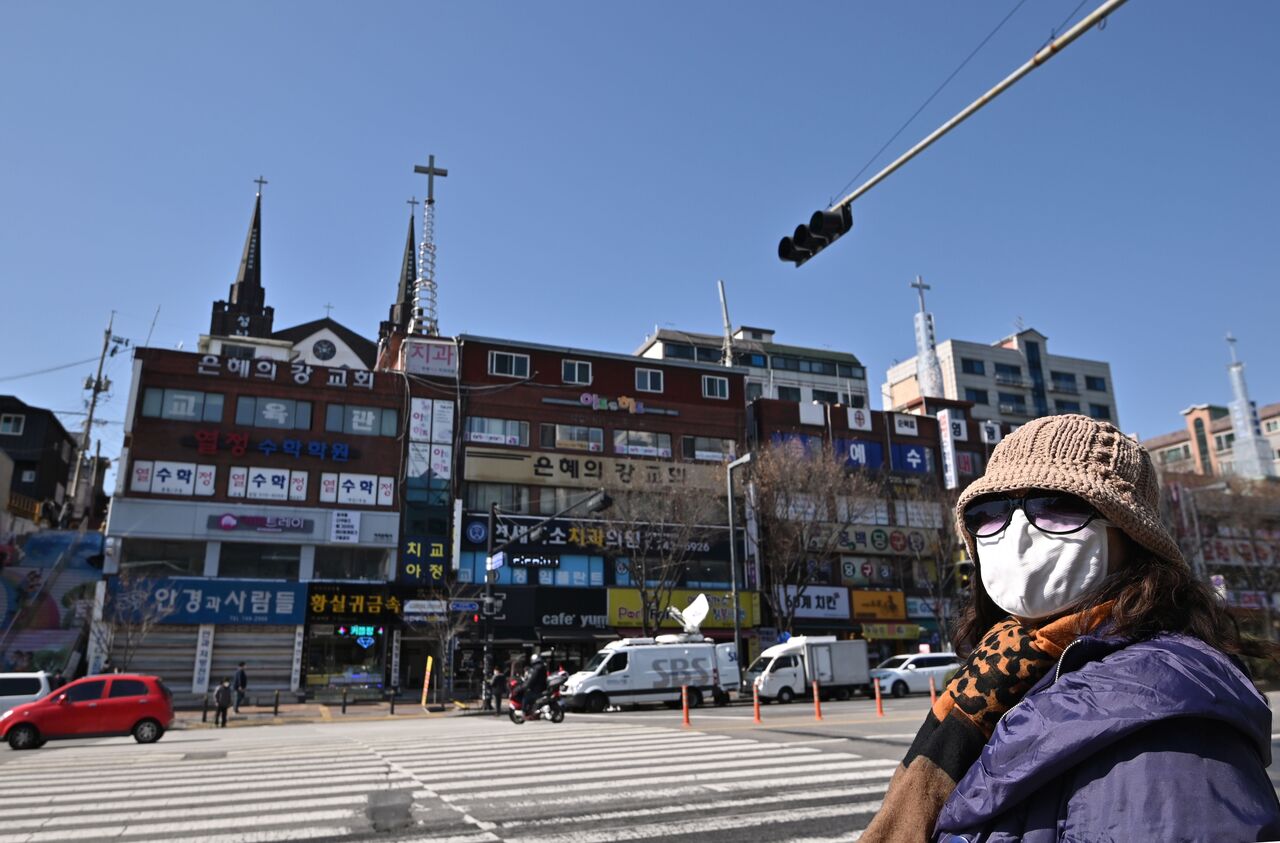Coronavirus: From 'crazy zumba aunties' to church devotees, South Korea's growing clusters raise concerns
Sign up now: Get insights on Asia's fast-moving developments

A building housing the Grace River Church, one of the major coronavirus clusters in South Korea, in Seongnam.
PHOTO: AFP
Follow topic:
SEOUL - The Latin dance exercise was once popular as a calorie-burning workout that celebrities swore by to lose weight by as much as 30kg.
But the mention of zumba now sends chills down the spines of many in South Korea after more than 100 cases of community infection of the coronavirus were linked to it.
Netizens lashed out at a group of "crazy zumba ajummas (Korean for auntie)" for spreading the virus in the western city of Cheonan even as zumba instructors defended the activity.
The zumba-linked infections and rise in small coronavirus clusters are raising concerns as the number of cases continues to grow, reaching 8,799 on Saturday (March 21). There were 147 new cases, and the death toll hit 102.
Prime Minister Chung Sye-kyun on Saturday urged religious, sports and entertainment facilities to suspend operations, and people to avoid travel and socialising over the next 15 days to curb the spread of the virus.
Social distancing also helps as the virus can spread quickly in crowded, enclosed spaces, experts warned.
Infectious diseases professor Kim Woo-joo of Korea University Guro Hospital said people can reduce the risk of infection in crowded spaces by keeping a distance of 1m to 2m from others, and avoiding direct contact.
Cluster infections account for 80 per cent of South Korea's confirmed cases, the largest cluster being linked to a branch of the secretive Shincheonji Church of Jesus in south-eastern city Daegu. The city has the highest number of cases, 6,344 as of Saturday.
Capital city Seoul has reported 314 cases, with another 321 in the surrounding Gyeonggi province.
Major clusters revolve around healthcare facilities, such as Daenam Hospital (119 cases) in Cheongdo, and religious organisations, including River of Grace Church (60 cases) in Seongnam city.
Last week, Gyeonggi imposed a new administrative order on around 15,000 entertainment facilities, including Internet cafes, karaoke rooms and dance clubs.
They are required to take measures such as regular disinfection and maintaining good ventilation, or risk getting their business licence suspended.
Gyeonggi governor Lee Jae-myung said the order is needed to minimise the risk of droplet-based infection at these facilities, which tend to be small, confined spaces.
The move came after a bout of small cluster infections emerged around the country.
In Seoul, there are 91 cases among telemarketers working at a call centre and nine linked to an Internet cafe.
Other clusters include a coin karaoke room in South Gyeongsang province (seven cases) and a kindergarten in Busan (six cases).
In South Chungcheong province, zumba has "caused fear in Cheonan city", said JoongAng Ilbo newspaper.
The city's first two cases confirmed on Feb 25 are both linked to zumba.
The first is a 47-year-old woman who attended a zumba class, and the second, a 50-year-old zumba instructor who taught regularly at three fitness centres and had 60 students she met regularly.
By March 2, the cluster had grown to 77 cases, including family members of zumba instructors and students, with one patient a two-year-old child. Cheonan closed 10 fitness centres and community centres offering zumba lessons.
The final tally in the province, which includes Asan city, is now 103 cases. Most of them are women ranging in age from their 20s to 50s.
Zumba-linked infections have since spread beyond the region to Sejong (a government official learning zumba), Seoul (zumba instructor in her 20s who attended a Feb 15 workshop held in Cheonan), and Gyeonggi (mother-in-law of a zumba instructor living in Cheonan).
Health authorities said the virus could have spread so fast because zumba classes tend to be conducted in small rooms with poor ventilation and students standing a few centimetres apart.
Under such conditions, sweat and other bodily fluids could be transferred easily from one person to another, they added.
As animosity against zumba dancers grows, one woman shared her experience in an online forum, calling for an end to the hurtful comments.
Happymonjju said she attended a zumba class at a fitness centre on Feb 19 but was told in a call to the coronavirus hotline that she did not need to be tested as infections linked to the centre were traced to a Feb 21 class.
But her husband developed high fever on March 2 and tested positive for the coronavirus on March 4.
She and her two children tested positive the next day, even though they had no symptoms, she said.
"I regret not taking the virus test earlier, and I feel remorse for causing harm and being a threat to my neighbourhood," she wrote, adding that she was careful to stay home and wore a mask when she went the nearby supermarket and bakery.
But she still received flak online and was called socially irresponsible as she "went out a lot".
"I want to die because I think I caused too much damage... Even without hate comments, I am already experiencing mental hell."

